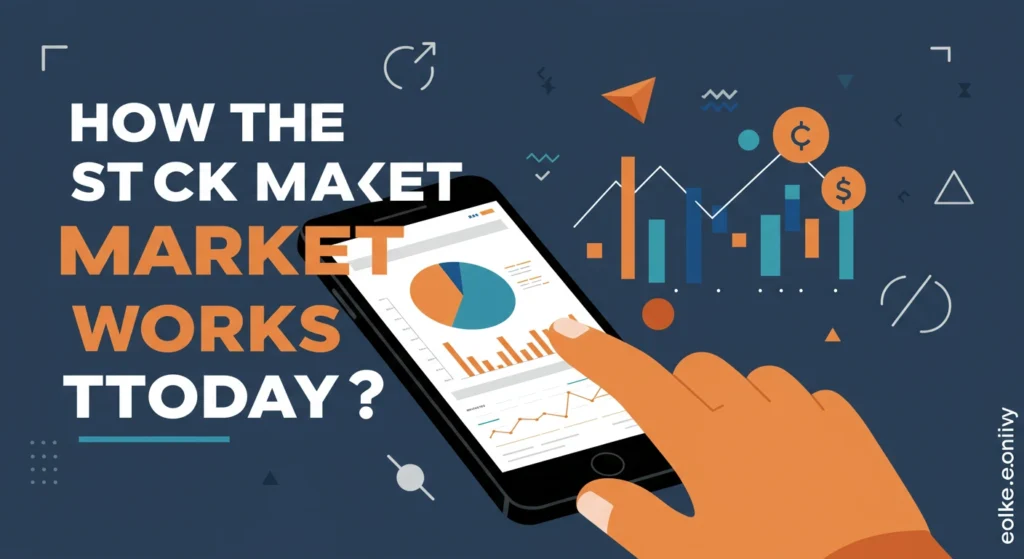The stock market can feel complicated, especially with so many apps, influencers, and headlines throwing around terms like “bull run,” “IPO,” and “quant trading.” But at its core, it’s not as complex as it seems.
In this guide, we’ll explain how the stock market works today—from the basics of what a stock is to the modern systems that power trades in milliseconds.
Whether you’re a beginner or brushing up your knowledge, here’s a no-fluff overview.
What Is the Stock Market?
The stock market is a system where people buy and sell ownership in companies. These pieces of ownership are called shares or stocks.
When you buy a stock, you’re buying a small piece of that company. If the company does well, the value of your shares usually goes up. If it doesn’t, your shares could lose value.
Keyword tie-in: stock market, how stock market works
Why Companies Sell Stocks
Companies sell stock to raise money. Instead of taking a loan, they offer part ownership to the public through an Initial Public Offering (IPO).
Once shares are sold in the IPO, they’re traded on stock exchanges, like the New York Stock Exchange (NYSE) or NASDAQ.
What Makes Stock Prices Go Up or Down?
Stock prices change constantly, based on what people think a company is worth.
Prices are influenced by:
- Company performance (earnings, growth, revenue)
- News and events (new products, lawsuits, CEO changes)
- Economic trends (interest rates, inflation)
- Market sentiment (investor confidence or fear)
In short, prices move because of supply and demand. If more people want to buy a stock than sell it, the price goes up. If more people want to sell, it goes down.
How Do You Buy or Sell Stocks?
In 2025, most people use brokerage apps like:
- Robinhood
- Fidelity
- Charles Schwab
- Public
- E*TRADE
How it works:
- Open a brokerage account
- Fund it with cash from your bank
- Search for the stock you want (e.g., AAPL for Apple)
- Choose how many shares to buy
- Hit “Buy”
Trades typically settle in T+2 (two business days), though some platforms offer instant settlement for small trades.
What Are Stock Exchanges?
A stock exchange is a marketplace where stocks are listed and traded. The most well-known include:
- NYSE (New York Stock Exchange) – Home to big companies like Coca-Cola and JPMorgan
- NASDAQ – Tech-heavy, includes Apple, Microsoft, Tesla
- Other global markets – London Stock Exchange (LSE), Tokyo Stock Exchange (TSE), etc.
Exchanges use order books to match buyers and sellers electronically.
Types of Stocks
1. Common Stocks
Most people invest in common stock. You get voting rights and may receive dividends.
2. Preferred Stocks
No voting rights, but you get fixed dividends and higher claim in case of bankruptcy.
3. Growth Stocks
Companies expected to grow fast—higher risk, higher potential return (e.g., tech startups).
4. Dividend Stocks
Pay regular income—more stable but slower growth (e.g., utilities or blue chips).
What’s an ETF or Index Fund?
You don’t have to pick individual stocks.
ETF (Exchange-Traded Fund):
A basket of stocks you can buy like a single stock (e.g., SPY tracks the S&P 500).
Index Fund:
Similar to ETFs but may have different fee structures and trade at end-of-day prices.
These are great for long-term investing and diversification.
What Is a Stock Portfolio?
Your portfolio is the collection of investments you own—stocks, ETFs, bonds, etc.
A smart portfolio is:
- Diversified: Spread across sectors and companies
- Balanced: Includes low-risk and high-risk assets
- Long-term focused: Not built on daily hype
Who Controls the Stock Market?
No one controls it directly. But several institutions play key roles:
- SEC (Securities and Exchange Commission): Regulates markets
- FINRA: Oversees brokers
- Federal Reserve: Impacts markets through interest rate policies
- Market Makers & Algorithms: Provide liquidity and fast trade execution
Risks of Stock Market Investing
Investing isn’t risk-free. Here are common risks:
- Market risk: The whole market drops (e.g., due to recession)
- Company risk: A single company underperforms
- Liquidity risk: You can’t sell your stock quickly
- Emotional risk: Panic-selling during a downturn
Rule: Never invest money you can’t afford to lose.
Tips for New Investors in 2025
✅ Start small — fractional shares make this easy
✅ Focus on long-term growth, not daily moves
✅ Use dollar-cost averaging (invest a fixed amount regularly)
✅ Don’t follow hype blindly
✅ Keep fees low with ETFs or no-commission brokers

Final Thoughts
The stock market today is faster, more digital, and more accessible than ever. But the basic principles haven’t changed.
Buy companies you believe in. Stay consistent. Be patient.
Investing is a long game, not a lottery.
Want more finance tips without the jargon?
Subscribe to oklee.online for weekly guides on stock investing, saving, and growing your money smarter in 2025 and beyond.



